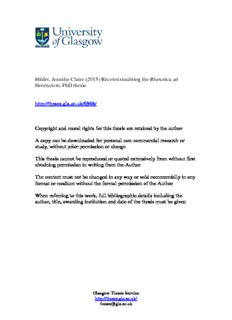
Recontextualising the Rhetorica ad Herennium Jennifer Claire Hilder BA PDF
Preview Recontextualising the Rhetorica ad Herennium Jennifer Claire Hilder BA
Hilder, Jennifer Claire (2015) Recontextualising the Rhetorica ad Herennium. PhD thesis http://theses.gla.ac.uk/6968/ Copyright and moral rights for this thesis are retained by the author A copy can be downloaded for personal non-commercial research or study, without prior permission or charge This thesis cannot be reproduced or quoted extensively from without first obtaining permission in writing from the Author The content must not be changed in any way or sold commercially in any format or medium without the formal permission of the Author When referring to this work, full bibliographic details including the author, title, awarding institution and date of the thesis must be given Glasgow Theses Service http://theses.gla.ac.uk/ [email protected] Recontextualising the Rhetorica ad Herennium Jennifer Claire Hilder BA (Hons), MPhil Submitting in fulfilment of the requirements for the Degree of PhD School of Humanities College of Arts University of Glasgow September 2015 © Jennifer Hilder Abstract This thesis will provide a sustained analysis of the relationship between the Rhetorica ad Herennium and its context in early first century BCE Rome. Over 250 examples in the Rhetorica ad Herennium illustrate the text’s rhetorical theory, but in so doing they also provide a significant insight into the history, law, and politics of this period. As I demonstrate, these examples show the preoccupations and perspectives of orators who were not necessarily from the political elite. They illustrate what could and could not be discussed in speech, and the modes of oratory that were encouraged by the author – popularis or not. The author’s focus on forensic oratory also has important implications for understanding the use of the law and legal knowledge. An important strand of this thesis is to compare the examples in the Rhetorica ad Herennium to those of Cicero’s contemporary De Inventione. Although the two texts have often been treated as a pair, there are differences between the two. The contrasts are noteworthy in themselves, but they also emphasise the independence of the author of the Rhetorica ad Herennium and the potential to adapt theories and approaches as necessary. This is also an educational text, and the way it is constructed relates closely to its audience. I argue that the post-Social War context of the Rhetorica ad Herennium is key to understanding this audience, who may include newly enfranchised Italians using the Roman legal system for the first time. By recontextualising the Rhetorica ad Herennium, it becomes clear that it is a very different text to the De Inventione in many ways. By highlighting these differences, I show that the work can stand alone as an object of enquiry and serve as a rich source for Roman Republican historians. Table of Contents Acknowledgements 7 Author’s Declaration 9 Abbreviations 11 Introduction 13 Chapter 1: Contextualising pre-Sullan Rome 39 Chapter 2: A rhetorical handbook 63 Chapter 3: Exempla and political history 85 Chapter 4: Popularis oratory, invective and licentia 117 Chapter 5: Pathos and maiestas in criminal trials 140 Chapter 6: Civil law and the jurists 165 Chapter 7: Educating the reader 191 Conclusion 207 Bibliography 213 Acknowledgements I am very grateful to all those who have helped me throughout my thesis, including my supervisors Catherine Steel and Henriette van der Blom first and foremost, whose advice has been invaluable for developing my ideas and arguments. The Classics department in Glasgow and the advisory board of the Fragments of the Republican Roman Orators project have been two other sources of much welcome guidance and friendship. I would also like to thank the Classics postgraduates, especially Sarah and Christopher, as well as Christa Gray and Fraser Rowan for moral support and endless cups of tea. I am also grateful to have had the opportunity to present my research in Glasgow, Edinburgh, Warsaw and Turin, and I thank the organisers and audiences for their comments. For financial support I am indebted to the European Research Council and the University of Glasgow’s College of Arts Graduate School, without whom I could not have undertaken this thesis. I also had the great pleasure of staying at the Fondation Hardt in the latter stages of my thesis with funding from the Roman Society. Finally, to friends and family, and to Galen, thank you for the wonderful evenings, weekends, and holidays that have made these three years more than a thesis. Needless to say, any mistakes that remain here are my own. Author’s Declaration I declare that this thesis is the result of my own work and that I have referenced sources in cases where ideas are not my own: any omission of an accurate reference is an oversight on my part and will be corrected. This dissertation is the result of my own work and has not been submitted for any other degree at the University of Glasgow or any other institution. Signature _______________________________ Printed name _______________________________
Description: